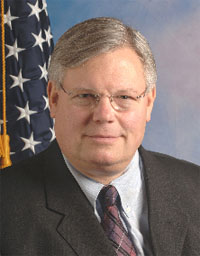NY Senate defeats marriage bill

Openly gay state senator Tom Duane inspired much support for the marriage equality bill in the New York Senate but came up eight votes short of victory Wednesday.
The bill, which Democratic Governor David Paterson was expected to sign right away, would have made New York — the third largest populated state in the country— the sixth state to provide equal marriage rights to gay couples.
Opponents of the measure –with one exception—sat silently throughout more than two hours of discourse about the bill, while 18 Democrats –many of the African Americans and Jews—stood to urge support for the bill.
The bill’s sponsor, openly gay Senator Tom Duane, in closing debate on the measure, sighed heavily and acknowledged the outcome of the vote was still uncertain. The bill needed 32 votes to pass and, while the Senate generally takes up bills only after the leadership knows it has the votes to pass, the marriage bill was an exception. No one –given 32 Democrats and 30 Republicans in the chamber—knew what the result would be.
“We have work to do in New York, and elsewhere,” said Marty Rouse, national field director for the Human Rights Campaign, which operated phone banks for constituents to call their senators on the issue. “We’re getting closer to equality, but we’re not there yet.”
The chamber was silent when the vote was announced just before 3 p.m.
The debate preceding the vote included numerous African-American senators emphasizing how similar arguments against gay marriage parallel arguments made decades ago against interracial marriage. It included many vigorous statements that the law would not affect religious freedoms.
And it included many tips of the proverbial hat to Senator Duane and his partner in life Louis Webre.
“In my family and culture, especially as it relates to my religion, it has always been considered that, if you were living together and not officially married, you were considered living in sin,” said Senator Velmanette Montgomery, an African American Democrat from Brooklyn. “So, for those of us who believe in that religious tenet, the reason why to support same-sex marriage is that we do not want them to live in sin.”
Senator Ruth Hassell-Thompson, an African American Democrat from Williamsbridge, shared the touching story of a brother who was estranged from his family because he was gay. She described years of trying to find him and of learning, upon the death of his partner, how her brother was left with none of the routine benefits of survivorship.
“Alabama, Arkansas, Delaware, Florida, Georgia, Kentucky, Louisiana, Maryland, Missouri, Mississippi, North and South Carolina, Tennessee, Texas, Virginia, the District of Columbia, and Nebraska,” read Senator Eric Adams, an African American Democrat from Brooklyn. “All of these states at one time or another sold blacks into slavery and participated in legal slavery because a numerical majority” which supported slavery at the time. “But a numerical majority in one place does not mean they are in the right place. We must lead the country to the right place.”
“The same comments being made against same-sex marriage were the same comments my grandmother received in Alabama when she wanted to marry my grandfather,” said Adam.
Senator Bill Perkins, an African American Democrat from Harlem, started by saying to the bill’s openly gay sponsor, Tom Duane (D-Manhattan) “Thank you, brother.” Then he turned to the galley where gay marriage supporters sat watching the debate and said, “Thank you, movement –thank you for your vigilance and your push to get us where we are today.”
Regardless of the outcome of the vote, said Perkins, change is coming “and I can see Dr. Martin Luther King smiling down on us today –recognizing that his sacrifice was not in vain.”
Senator Malcolm Smith, an African American Democrat from St. Albans, likened Duane to black civil rights icon Rosa Parks.
Many Jewish senators spoke out, too, drawing parallels between the struggle for equal rights for gays and Jews.
“This is not just for the gay and lesbian community,” said Senator Suzi Oppenheimer, a Jewish Democrat from Mamaroneck. “It is for all of us, a measure of our humanity.”
The Senate vote, conducted in a special session called by Governor Paterson, came less than 24 hours after the state Assembly –which had passed a marriage equality bill in May— passed the bill a second time. The Assembly action, conducted in “extraordinary session,” meant the Senate bill –if it had passed– could have gone straight to the governor for his signature. Paterson has been a vigorous advocate for the measure and instrumental in forcing the Senate vote.
The fate of the marriage equality bill had been caught up for months in the partisan wrangling.
The New York Senate had repeatedly been on the brink of voting on the marriage equality bill. In early November, following the loss of a marriage equality law by referendum in Maine, the New York Senate did a last-minute back-off from a vote because supporters believed they did not have the votes to win. House Democrats, meeting with Paterson, agreed to vote by the end of the year.
But it wasn’t clear who the delays would help. While pro-gay activists used the time to lobby for the necessary 32 vote victory, the anti-gay National Organization for Marriage used the time to call out a warning –that it would organize to defeat any Republican who voted for the bill, even if the bill failed.
Same-sex couples can currently obtain marriage licenses in Connecticut, Iowa, Vermont, and Massachusetts –albeit, in Massachusetts, the couple must either reside in the state or in a state that has not prohibited same-sex marriages. New Hampshire’s marriage equality law takes effect January 1.
The City Council of Washington, D.C., on Monday gave its first vote of approval to a marriage equality bill there. The bill must now go to a second and final vote –expected December 15—then go through a 30-day Congressional review period.


Leave a Reply